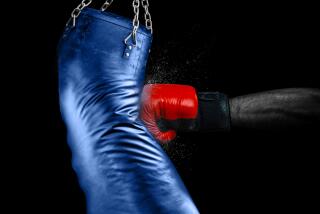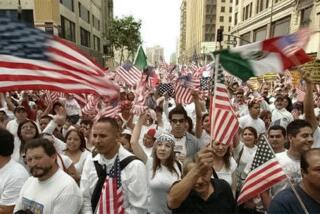Prop. 8’s battle lessons
Ever since Proposition 8 passed Nov. 4, enshrining heterosexual-only marriage in the California Constitution, demonstrators from Sacramento to San Diego have staged daily marches and protests to express their anger and disappointment that homosexuals will continue to be treated as second-class citizens. It’s a stirring movement, reminiscent of past civil rights struggles, but it raises a troubling question: Where were these marchers beforebefore the election?
Like nearly every aspect of the fight against Proposition 8, the recent protests come too late to make a difference. Opponents of the measure ran a disorganized campaign that consistently underestimated the strength of the other side. Apparently lulled by poll numbers that showed the initiative was likely to fail, the campaign’s fundraising efforts were lackluster -- until it discovered that the Yes on 8 side was raking in millions from Mormons and members of other churches. By the time fundraising began in earnest, there wasn’t time to mount a strong opposition.
Same-sex marriage advocates produced only one hard-hitting commercial, depicting a pair of Mormon missionaries ripping up the wedding license of a married gay couple, but didn’t air it until election day. The campaign made little effort to reach out to the African American community, whose large turnout and overwhelming support of Proposition 8 were enough to put it over the top. And while it’s nice that Gov. Arnold Schwarzenegger now says he hopes that the courts will overturn the initiative, he was all but invisible before Nov. 4.
The failure of leadership extends beyond the governor. If there was a public face to the No on 8 campaign, it was San Francisco Mayor Gavin Newsom, who is (notoriously) heterosexual. Where were the gay leaders? It’s hard to imagine the civil rights movement of the 1960s succeeding without Martin Luther King Jr. or Malcolm X, or to imagine the women’s suffrage movement without the likes of Susan B. Anthony.
Wresting equal rights from a society reluctant to grant them isn’t easy. It can take years of nonviolent resistance, passionate speeches and even in-your-face radicalism. If people who voted yes on Proposition 8 say they didn’t see it as a civil rights matter, that’s because until now there has been nothing resembling a civil rights crusade by the gay community. Courts can assist downtrodden groups, but they never have and never will be enough to guarantee equality on their own.
The fight for gay equality won’t end with Proposition 8; it will continue until the battle is won, in California and across the nation. Supporters should take some lessons from the many mistakes made in this round.
More to Read
A cure for the common opinion
Get thought-provoking perspectives with our weekly newsletter.
You may occasionally receive promotional content from the Los Angeles Times.






